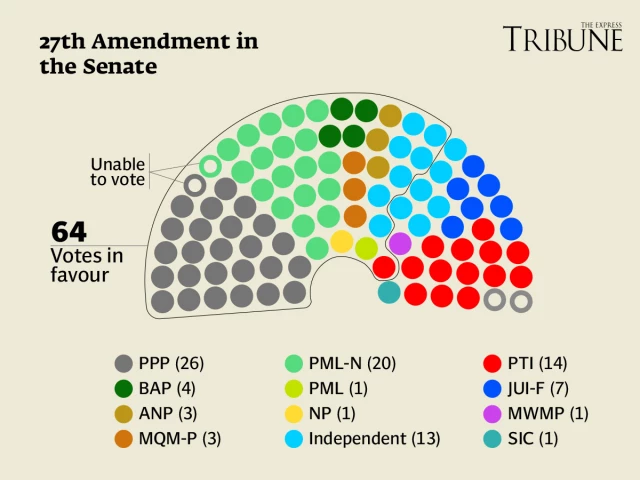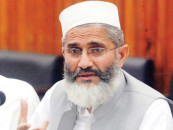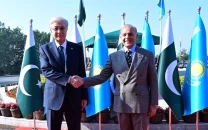Senate approves 27th Amendment with two-thirds majority
Opposition members protest, tear up copies of bill, raise slogans against government

The Senate approved the 27th Constitutional Amendment Bill 2025, with a two-thirds majority amid uproar from opposition members. Senate Chairman Yousuf Raza Gillani announced that 64 members voted in favour of the bill, while none opposed it. “The bill is hereby passed,” he declared.
Earlier, Law Minister Azam Nazeer Tarar presented the motion for approval of the 27th Constitutional Amendment, which was adopted by a majority vote. During the session chaired by Gillani, the law minister presented each clause of the bill separately for approval.
Members of the Pakistan Tehreek-e-Insaf (PTI) staged a strong protest during the proceedings. They tore up copies of the bill and gathered in front of the chairman’s dais, chanting slogans against the government. Despite the commotion, voting continued and clause-by-clause approval was granted.
PTI Senator Saifullah Abro did not join the protest and instead voted in favour of the amendment. JUI-F Senator Ahmed Khan and Senator Naseema Ehsan also supported the bill.
Earlier, Farooq Hamid Naek, Chairman of the Senate Standing Committee on Law and Justice, presented a report on the 27th Constitutional Amendment before the upper house of parliament.
A joint meeting of the Senate and the National Assembly's law and justice standing committees had approved the amendment bill with minor tweaks, amid an opposition boycott yesterday. Naek briefed the House on the deliberations regarding the 27th Constitutional Amendment, saying the joint committee session included all members and special invitees who proposed certain amendments.
Naek tabled the report in the Senate today, with Chairman Syed Yousaf Raza Gilani presiding over the proceedings.
“The opposition should also be called for these discussions,” he added. “The deliberations went on for two full days, often extending into the evening. The bill, as presented to the Senate by the committee, has undergone numerous changes”.
Opposition members from the Pakistan Tehreek-e-Insaf (PTI) staged strong protests in the chamber, tearing up copies of the bill and chanting slogans in front of the chairman’s dais.
Senator Hamid Khan told reporters that PTI and JUI senators had boycotted the session, claiming establishment pressure had influenced some lawmakers to side with the government.
Speaking during the Senate debate, Muttahida Qaumi Movement (MQM-P) parliamentary leader Faisal Ali Subzwari said the 27th Constitutional Amendment addressed crucial national issues, particularly the reforms under Article 243.
He said Pakistan had faced numerous challenges and, despite being a nuclear power, continued to confront threats due to short-sighted policies and indecisiveness. “We must once and for all acknowledge the difference between the Afghan Taliban and terrorism,” he said, adding that the nation should stand united in support of its armed forces.
Referring to the judicial reforms in the amendment, Subzwari questioned whether previous courts had benefited the common man. “Our concern is not about political gain, but about strengthening Pakistan and ensuring justice,” he said.
He also discussed the importance of empowering local governments, citing Article 140-A and related provisions. “We are grateful to the law minister, the mayor of Karachi, and the chief minister of Balochistan for taking this issue seriously,” he said.
Subzwari clarified that MQM’s stance on local governments was often misunderstood. “We are not rolling back the 18th Amendment — in fact, we are protecting it,” he said. “The rights of provinces must reach the people directly. This is not about taking power away from chief ministers or governors; it’s about strengthening democracy.”
Senator Rubina Khalid of the Pakistan Peoples Party (PPP) said that her party had faced the harshest criticism regarding the 27th Constitutional Amendment, but emphasized that the legislative process was an evolving one that required amendments and improvements over time.
“This law, like all others, is part of an evolutionary process — it needs to be reformed from time to time,” she said. “People often forget that Zulfiqar Ali Bhutto was a victim of judicial murder. Did we get justice? Yes — but it took until 2024. Despite that, we remained patient.”
Welcoming the amendment, particularly the sections related to judicial reforms, Senator Khalid said the proposed changes would strengthen the system and the state. “We always talk about the rights of the people, but we must also talk about the rights of the state. We keep asking the state to give us everything, but what do we give back? Citizens also have duties — the state is like our mother,” she said.
Speaking after her, Maulana Atta Ur Rehman recalled the vision of Pakistan’s founder, Muhammad Ali Jinnah. “We were told that this is a free country — where there are no Muslims or Christians, only Pakistanis,” he said. “But today, we see that the same free country has drifted far from that vision.”
Draft of 27th Amendment
Article 248 – Presidential Immunity
- A new clause grants the President lifetime legal immunity.
- Phrase “Notwithstanding any judgment of any court” to be inserted before the word “President” in clause (1).
- Clause (2) revised: No criminal proceedings shall be initiated or continued against the President for life, and against a Governor during their term.
Article 243 – Defence structure & appointments
- President, acting on the Prime Minister’s advice, to appoint:
Chief of the Army Staff, concurrently Chief of the Defence Forces
Chiefs of the Navy and Air Staff
President to determine their salaries and allowances.
- Office of the Chairman Joint Chiefs of Staff Committee to be abolished from November 27, 2025.
- Strategic military authority to be concentrated under the Chief of the Defence Forces.
- Prime Minister, on the recommendation of the Chief of the Defence Forces, to appoint the Commander of the National Strategic Command.
- Officers granted constitutional protection; can only be removed through Article 47 procedure.
- Presidential immunity under Article 248 extended to these officers.
- Federal government is to define its responsibilities, while the President (on PM’s advice) sets salaries and privileges.
Article 200 – Transfer of High Court Judges
- President empowered to transfer High Court judges between provinces on Judicial Commission’s recommendation. Commission to include the Chief Justices of both relevant High Courts.
- Transferred judge’s seniority counts from initial appointment date.
- No transfer may make a judge senior to the Chief Justice of the transferee High Court.
- A judge refusing transfer shall be deemed retired.
Federal Constitutional Courts (New Chapter – Part VII)
- Establishes Federal Constitutional Court (FCC) with:
Chief Justice and judges determined by Parliament (or temporarily by the President)
Equal representation from each province
- FCC to have original jurisdiction in:
Constitutional disputes between governments
Fundamental rights enforcement cases
- Pending petitions or appeals in the Supreme Court or its constitutional benches under this jurisdiction to be transferred to FCC.
- Judges’ tenure: until age 68
- Chief Justice: 3-year term, retires after completion regardless of age
Article 175A – Judicial Commission & Supreme Court Changes
- Expands Judicial Commission of Pakistan (JCP) composition to include:
Chief Justice of the FCC
Chief Justice of the Supreme Court
Senior judges of both courts
One additional judge jointly nominated by both chief justices
- Senior of the two chief justices to chair the Commission.
- Abolishes suo motu powers and deletes Articles 184, 186, and 191A.
- Removes the President’s authority to refer legal questions to the Supreme Court for advisory opinions.
Earlier, a debate on the amendment was underway in the absence of House Chairperson Syed Yousaf Raza Gilani. The final draft of the amendment had been completed following last-minute negotiations between the government and the Pakistan Peoples Party (PPP), Federal Law Minister Azam Nazeer Tarar confirmed.
“Some changes were made, and they have been incorporated,” Tarar said, adding that the draft has now been sent for printing.
The announcement comes after hours of deliberations between party delegations, aimed at reaching a consensus on key provisions of the amendment.
Despite an apparent deadlock between the two major political parties and criticism from the opposition, the government is optimistic that the Amendment will pass. “The situation is tight, but we will manage to secure the required numbers. Voting will begin as soon as all members are present,” said Federal Law Minister Azam Tarar.
To pass a constitutional amendment in the Senate, a two-thirds majority is required, meaning 64 out of 96 senators must vote in favour.
The ruling alliance currently holds 63 of the 96 Senate seats. Senator Irfan Siddiqui is undergoing treatment in the hospital, and Senate Chairman Yousaf Raza Gillani is also unable to cast his vote, complicating the government’s efforts. To secure approval, the Pakistan Muslim League-Nawaz (PML-N) and Pakistan Peoples Party (PPP) are coordinating efforts to win support from National Party senators.
Within the coalition, the PML-N holds 20 seats, the PPP 26, while the Balochistan Awami Party (BAP) has four, the Muttahida Qaumi Movement (MQM) three, and one each from the National Party and Pakistan Muslim League-Quaid (PML-Q).
Independent senators aligned with the government—Abdul Karim, Abdul Qadir, Mohsin Naqvi, Anwar-ul-Haq Kakar, Asad Qasim, and Faisal Vawda—are also expected to support the amendment. On the opposition side, independent Senator Naseema Ehsan and three Awami National Party (ANP) senators have pledged their votes.
Read: PM, senators feast on halwa after finalizing 27th Amendment
Once passed in the Senate, the amendment will move to the National Assembly, scheduled to meet at 4:30pm. With 326 sitting members out of 336, the ruling coalition already commands 237 votes, surpassing the 224 needed for constitutional amendments. The PML-N leads with 125 members, followed by the PPP with 74, MQM-P 22, PML-Q five, Istehkam-i-Pakistan Party four, and one each from PML-Z, BAP, and the National Party, along with four independents.
The opposition has criticised the amendment. On Sunday, the Tehreek Tahafuz Ayeen-e-Pakistan (TTAP) denounced it as an “assault on the Constitution” and “Pakistan’s 9/11,” announcing a nationwide protest campaign. The alliance plans to mobilise public opinion, engage trade organisations, and consult legal professionals, warning, “The judicial system is being dismantled. Lawyers will play a key role in this movement”.
Senate live session
Deliberations in the Senate centered on three core issues of the 27th Constitutional Amendment: the Federal Courts Commission (FFC), transfer of judges, and Article 243. The session was marked by heated exchanges, with discussions often overshadowed by political rhetoric and inter-party disputes.
Senator Shahzaib Durrani of the ruling coalition emphasized listening to all sides but criticized PTI senators: “Compared to 9/11, did you even read the amendments? The opposition just rejects everything without discussion.” PTI senators vocally defended their party, frequently interrupting proceedings.
Senator Fauzia Arshad criticized the exclusion of opposition voices: “We were not consulted. Not being given our right to openly debate and present suggestions undermines the legitimacy of this process”.
PTI Senator Ali Zafar said while speaking to the media in Parliament that the opposition would block the 27th Constitutional Amendment if the government fails to secure the required numbers.
“There is a possibility that they may not be able to table it today,” he added.
The senator also emphasized the opposition’s stance against granting immunity from criminal proceedings. “Anyone who has committed a crime, whether a president or a governor, must be held accountable under the law and the Constitution,” he said.
Federal Minister for Information Atta Tarar expressed confidence in the ongoing parliamentary process, saying, “Alhamdulillah, the entire process is proceeding smoothly.” Responding to questions about whether the ruling coalition had the necessary numbers to pass the amendment, he stated, “I believe there will be no issues regarding the numbers”.
Regarding potential changes to the amendment based on coalition partners’ suggestions, Tarar added, “We have had extensive discussions with our allies. When there is any development, it will be made public”.
National Assembly member Naveed Qamar stated that the final draft of the amendment has been completed and sent for printing. “The draft is the same as the one finalised by the committee yesterday,” he said, adding that the ruling coalition enjoys a stronger position in the National Assembly compared to the Senate.
Read more: Joint parliamentary committee approves draft of 27th Constitutional Amendment
Senator Zameer Hussain Ghumro raised concerns about judicial independence, stating: “Changes to the FFC and judicial transfers could harm the autonomy of the judiciary. Executive control could lead to politically biased appointments".
The Tehreek-e-Tahafuz-e-Aain Pakistan (TTAP) and Pakistan Tehreek-e-Insaf (PTI) have strongly opposed the 27th Constitutional Amendment, calling it unconstitutional and against the spirit of Pakistan’s Constitution.
A key TTAP meeting, chaired by Mahmood Khan Achakzai in Islamabad, was attended by Senators Allama Raja Nasir Abbas, Hamid Khan, Noor-ul-Haq Qadri, and Humayun Mehmood. In a statement, TTAP said its members would not participate in any voting or ballot on the amendment, emphasizing that taking part in an unconstitutional process amounts to a deviation from the supremacy of the Constitution.
The movement criticized the amendment for undermining the Constitution’s basic structure, parliamentary balance, and federal principles. It also noted that Parliament is not authorized to pass a unilateral constitutional amendment and highlighted the lack of a comprehensive national consensus. TTAP vowed to continue protests against the amendment through constitutional, legal, and democratic means, describing it as “unconstitutional, undemocratic, and ineffective.”
Meanwhile, a joint parliamentary party meeting of PTI, also chaired by Mahmood Khan Achakzai, is underway. The session is attended by PTI Chairman Barrister Gohar, Salman Akram Raja, Senator Ali Zafar, nominated opposition leader in the Senate Allama Raja Nasir Abbas Jafri, and other members of the National Assembly and Senate. The meeting is expected to deliberate on the party’s stance and strategy regarding the amendment.




















COMMENTS (3)
Comments are moderated and generally will be posted if they are on-topic and not abusive.
For more information, please see our Comments FAQ